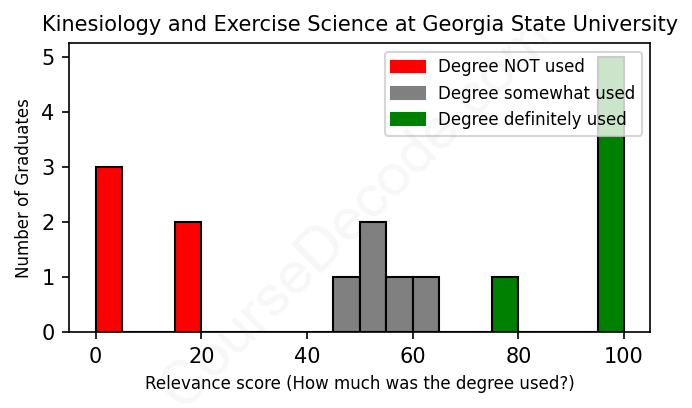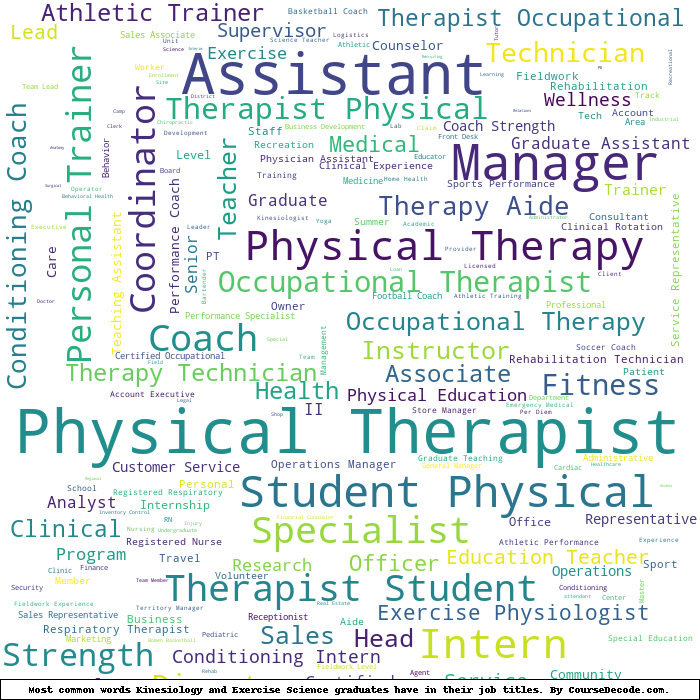
First, some facts. Of the Kinesiology and Exercise Science graduates from Georgia State University we've analyzed , here's how many have used (or NOT used) their degree in their career:

These are estimates based on AI analysis of 16 LinkedIn profiles (see below).
The verdict? Significantly below average. Overall, with an average relevance score of 54%, Kinesiology and Exercise Science graduates from Georgia State University have a much lower likelihood (-13%) of finding work in this field compared to the average graduate across all fields:
And for comparison, here's the chart for all profiles we've looked at across all degrees.
Also, after graduating, 37% of these graduates have pursued further education other than another Bachelor's degree (such as a Masters degree or other), compared to the average across all profiles of 35%. This suggests you may need more than just a Bachelors degree to be competitive as a Kinesiology and Exercise Science graduate.
See the details:
|
Relevance score: 100% We think this person has gone into a career highly relevant to their degree. We think this person has gone into a career highly relevant to their degree.
DEGREE INFOGraduated in 2022 from Georgia State University with a Bachelor of Science - BS in Kinesiology and Exercise Science. No other secondary education since. JOB HISTORY SINCE GRADUATIONPersonal Trainer Intern Excellence Wellness Solutions Aug 2022 - Dec 2022 ABOUTI am currently a Graduate Student at Georgia State University pursuing my Masters of Science degree in Exercise Science and am working as a GA in the fitness prescription lab. I have enjoyed learning about fitness wellness education and the basics of clinical physiology. Expanding my network and scope in my field is my main priority as I am actively seeking part-time job opportunities in relevant settings. I am very passionate when it comes to helping people improve their health and overall education about exercise! |
The top 10 most common jobs done by the graduates we've analyzed (ranked most common to least) are:
After going through all these LinkedIn profiles, it looks like most of the graduates from Georgia State University with a degree in Kinesiology and Exercise Science have ended up in jobs that are pretty relevant to their studies. A lot of them are working as rehabilitation technicians, exercise physiologists, personal trainers, and in occupational therapy roles. These positions are a perfect fit because they directly involve the knowledge and skills learned in Kinesiology, especially regarding human movement, exercise principles, and rehabilitation practices. For example, the roles at places like BenchMark Physical Therapy and various positions as exercise specialists clearly show how they apply their degree in a practical, hands-on way that helps people improve their physical health.
However, not every job they took is closely tied to their major. Some end up in positions like teaching or working in retail that don't really use their specific Kinesiology skills on a daily basis. Some take jobs in areas like sales, logistics, or even military positions that are far removed from exercise science. So, while many graduates are finding relevant work that leverages their Kinesiology background, there are definitely instances where they have to pivot into roles that don't directly relate to their specialization. This means that while there's a solid chance for jobs related to their field, not every graduate is staying in the Kinesiology lane after school.
Here is a visual representation of the most common words in job titles for Kinesiology and Exercise Science graduates (this is across all Kinesiology and Exercise Science graduates we've analyzed, not just those who went to Georgia State University):

The career trajectories of Georgia State University graduates in Kinesiology and Exercise Science appear to be a mixed bag, showcasing a range of experiences and outcomes. Many of these graduates tend to start their careers in relevant fields such as exercise physiology, rehabilitation, or wellness roles, particularly right after graduation. For instance, roles like Exercise Physiologist Intern or Rehabilitation Technician seem to be common first jobs, indicating a solid entry into the healthcare and fitness sectors, which align closely with their studies. Some graduates also ventured into teaching and educational roles, while others have taken on diverse positions that may not directly relate to their degrees, such as logistics and operations roles in the military or government sectors.
As we look further down the line, say five to ten years into their careers, we start to see some of these graduates making significant strides in relevant fields. Many have moved into established roles as occupational therapists, exercise specialists, or wellness coordinators, underscoring a progression towards more specialized careers in health and rehabilitation. However, there's also a noticeable number who have branched out into unrelated fields or have taken jobs that don't fully utilize their kinesiology and exercise science training. While some have managed to carve out robust and relevant careers, others appear to be navigating career paths that stray away from the kinesiology realm, leading to a blend of success and potential career misalignment. So, it's a bit of both worlds: many graduates follow promising paths in health and wellness, while others drift into various jobs that may not reflect their training.
Honestly, a Bachelor's degree in Kinesiology and Exercise Science can be pretty manageable, especially if you’re passionate about fitness and health. At Georgia State University, or really anywhere else, you’ll tackle a mix of core science courses, like biology and anatomy, alongside some hands-on classes where you get to learn about exercise techniques and wellness. The workload is generally reasonable compared to some other science-heavy majors, but it can definitely get challenging with lab work and practical applications. If you stay organized and keep up with your studies, you’ll likely find it’s a fulfilling experience without being overwhelmingly difficult. Just make sure you have a good balance of study time and fun, and you’ll do great!
Most commonly, in the LinkedIn profiles we've looked at, it takes people 4 years to finish a Bachelor degree in Kinesiology and Exercise Science.
Looking at the job paths of these Kinesiology and Exercise Science grads from Georgia State University, it seems like their earning potential is pretty mixed. Some, especially those who went into healthcare roles like Occupational Therapists or Exercise Physiologists, likely moved into decent paying positions after a few years of experience, while others, like the ones working in retail or as interns, probably started off on the lower end of the salary scale. The ones with consistent growth in their careers, especially in healthcare, seem to be doing reasonably well, but overall, it's a bit of a mixed bag—some are likely making good money now, while others may still be grinding to get to a comfortable financial spot.
Here is a visual representation of the most common words seen in the "about" section of LinkedIn profiles who have a Bachelor degree in Kinesiology and Exercise Science (this is across all Kinesiology and Exercise Science graduates we've analyzed, not just those who went to Georgia State University). This may or may not be useful:

Here are all colleges offering a Bachelor degree in Kinesiology and Exercise Science (ordered by the average relevance score of their Kinesiology and Exercise Science graduates, best to worst) where we have analyzed at least 10 of their graduates: